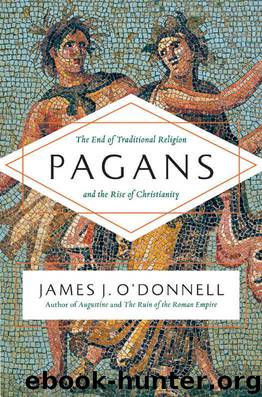Pagans: The End of Traditional Religion and the Rise of Christianity by James J. O'Donnell

Author:James J. O'Donnell [O'Donnell, James J.]
Language: eng
Format: epub
Publisher: HarperCollins
Published: 2015-03-16T23:00:00+00:00
Chapter 12
THE BIRTH OF PAGANISM
ALEXANDRIA OCCUPIED A MATCHLESS SITE ON ITS MAN-MADE harbor facing the Mediterranean at one of the mouths of the Nile. Easily the most cultured, sophisticated, and continuously wealthy city in the Mediterranean world, Alexandria was a home to many cultures, each newcomer enriching rather than displacing the others. Even while the old temple stood at Jerusalem, Alexandria had been a capital of Judaism. The earliest significant Christian writers and thinkers studied and worked there. By Constantine’s time, Alexandria was a hotbed of Christianity, and Christian doctrine had been established for more than a century when controversy erupted over the head of a priest named Arius.1
The church of Alexandria had been divided during the years of persecution between those who faced persecution without wavering and those who were more accommodating to the emperors’ norms. Peter, the bishop of Alexandria, felt some Christians had compromised their faith by participating in sacrifice. If they avoided sacrifice, he was prepared to be forgiving. If Christians, acceding to the authorities, had merely handed over Christian property—and particularly the books of scripture they cherished—Peter let them be. If they fled to avoid persecution—as he apparently did himself—there were no repercussions. Others, particularly the bishop Melitius of nearby Lycopolis, held out for excluding or disciplining those who had lapsed. These different approaches to the common oppressor became grounds for mutual hostility and recrimination within the community of Christians, in Alexandria as elsewhere.
The forgiving Peter was martyred in November 311. A new bishop was elected, but died himself of natural causes within a few months. The third bishop in a year, Alexander, inherited an unstable situation, in which external persecution had ceased but internal recrimination had not. Into this tense environment came Arius, probably from what is now Libya, preaching a controversial doctrine.
What Arius was thought to have said, in simplest terms, was that there was a difference and a distance between “Christ” and “God.” Diverse opinions had been ventured in many places over the last century. At one end of this spectrum, Jesus was Christ was God—from the beginning of all time and forever. At the other end, Jesus was a carpenter’s son from Nazareth with whom God was well pleased and who was thus exalted in stages to high esteem and standing. This Jesus remained a creature not creator, a divinized human being, not god from all eternity. Had he been “adopted” as a son by God? There was biblical language to support that view, as there was for every view on the spectrum.2 In a world where godhead had been growing in prestige and uniqueness in the hands of philosophers and theologians alike, subordination of Jesus to the mighty Father respected the feelings of many.
Challenged as unorthodox, Arius reacted cannily and candidly, proclaiming his views in a way that most found entirely orthodox. If you suspected him already, you thought this was cunning; if you supported him, you thought him well intentioned, seeking harmony within the church. Whatever he said only fueled the flames already burning.
Download
This site does not store any files on its server. We only index and link to content provided by other sites. Please contact the content providers to delete copyright contents if any and email us, we'll remove relevant links or contents immediately.
| Paganism | Wicca |
| Witchcraft |
Becoming Supernatural by Dr. Joe Dispenza(7112)
Tools of Titans by Timothy Ferriss(6957)
The Witchcraft of Salem Village by Shirley Jackson(6586)
Inner Engineering: A Yogi's Guide to Joy by Sadhguru(5905)
The Four Agreements by Don Miguel Ruiz(5520)
The Power of Now: A Guide to Spiritual Enlightenment by Eckhart Tolle(4762)
The Wisdom of Sundays by Oprah Winfrey(4631)
Room 212 by Kate Stewart(4111)
Fear by Osho(4090)
Pale Blue Dot by Carl Sagan(4014)
The David Icke Guide to the Global Conspiracy (and how to end it) by David Icke(3889)
Rising Strong by Brene Brown(3786)
Animal Frequency by Melissa Alvarez(3759)
How to Change Your Mind by Michael Pollan(3681)
Sigil Witchery by Laura Tempest Zakroff(3656)
Real Magic by Dean Radin PhD(3572)
Secrets of Antigravity Propulsion: Tesla, UFOs, and Classified Aerospace Technology by Ph.D. Paul A. Laviolette(3487)
The Art of Happiness by The Dalai Lama(3389)
Man and His Symbols by Carl Gustav Jung(3324)
